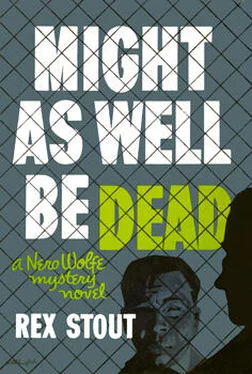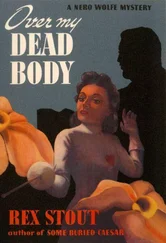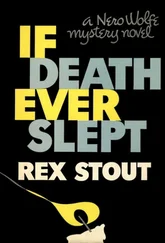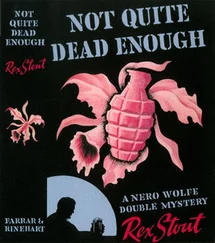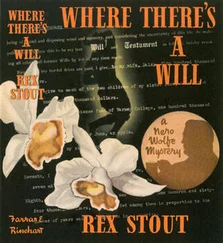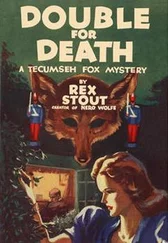The prosecution’s main attraction, though not its mainstay, had been the widow, Selma Molloy. She was twenty-nine, fourteen years younger than her husband, and was photogenic, judging from the pictures the papers had run. Her turn on the witness stand had sparked a debate. The Assistant DA had claimed the right to ask her certain questions because she was a hostile witness, and the judge had refused to allow the claim. For example, the ADA had tried to ask her, “Was Peter Hays your lover?” but he had to settle for “What were the relations between you and Peter Hays?”
She said she liked Peter Hays very much. She said she regarded him as a good friend, and she had affection for him, and believed he had affection for her. The relations between them could not properly be called misconduct. As for the relations between her and her husband, she had begun to feel less than a year after their marriage, which had taken place three years ago, that the marriage had been a mistake. She should have known it would be, since for a year before their marriage she had worked for Molloy as his secretary, and she should have known what kind of man he was. The prosecutor had fired at her, “Do you think he was the kind of man who should be murdered?” and Freyer had objected and been sustained, and the prosecutor had asked, “What kind of man was he?” Freyer had objected to that too as calling for an opinion on the part of the witness, and that had started another debate. It was brought out, specifically, that he had falsely accused her of infidelity, had physically mistreated her, had abused her in the presence of others, and had refused to let her get a divorce.
She had seen Peter Hays at a New Year’s Eve party three days before the murder, and had not seen him since until she entered the courtroom that day. She had spoken with him on the telephone on January 1 and again on January 2, but she couldn’t remember the details of the conversations, only that nothing noteworthy had been said. The evening of January 3 a woman friend had phoned around seven-thirty to say that she had an extra ticket for a show and invited her to come, and she had accepted. When she got home, around midnight, there were policemen in her apartment and she was told the news.
Freyer had not cross-examined her. One of the hundred or so details of privileged communications between a lawyer and a client furnished us by Freyer explained that. He had promised Peter Hays he wouldn’t.
Wolfe snorted, not his laughing snort. “Isn’t it,” he inquired, “a function of counsel to determine the strategy and tactics of defense?”
“When he can, yes.” Freyer, who had spent three-quarters of an hour reviewing the testimony and answering questions about it, had lubricated himself with a glass of water. “Not with this client. I’ve said he is difficult. Mrs. Molloy was the prosecution’s last witness. I had five, and none of them helped any. Do you want to discuss them?”
“No.” Wolfe looked at the wall clock. Twenty minutes to lunch. “I’ve read the newspaper accounts. I would like to know why you’re convinced of his innocence.”
“Well — it’s a combination of things. His expressions, his tones of voice, his reactions to my questions and suggestions, some questions he has asked me — many things. But there was one specific thing. During my first talk with him, the day after he was arrested, I got the idea that he had refused to answer any of their questions because he wanted to protect Mrs. Molloy — either from being accused of the murder, or of complicity, or merely from harassment. At our second talk I got a little further with him. I told him that exchanges between a lawyer and his client were privileged and their disclosure could not be compelled, and that if he continued to withhold vital information from me I would have to retire from the case. He asked what would happen if I did retire and he engaged no other counsel, and I said the court would appoint counsel to defend him; that on a capital charge he would have to be represented by counsel. He asked if anything he told me would have to come out at the trial, and I said not without his consent.”
The water glass had been refilled and he took a sip. “Then he told me some things, and more later. He said that on the evening of January third he had been in his apartment, alone, and had just turned on the radio for the nine-o’clock news when the phone rang. He answered it, and a man’s voice said, ‘Pete Hays? This is a friend. I just left the Molloys, and Mike was starting to beat her up. Do you hear me?’ He said yes and started to ask a question, but the man hung up. He grabbed his hat and coat and ran, took a taxi across the park, used his key on the street door, took the elevator to the fifth floor, found the door of the Molloy apartment ajar, and went in. Molloy was lying there. He looked through the apartment and found no one. He went back to Molloy and decided he was dead. A gun was on a chair against the wall, fifteen feet from the body. He picked it up and put it in his pocket, and was looking around to see if there was anything else when he heard footsteps in the hall. He thought he would hide, then thought he wouldn’t, and as he started for the door the policeman entered. That was his story. This is the first time anyone has heard it but me. I could have traced the cab, but why spend money on it? It could have happened just as he said, with only one difference, that Molloy was alive when he arrived.”
Wolfe grunted. “Then I don’t suppose that convinced you of his innocence.”
“Certainly not. I’ll come to that. To clean up as I go along: when I had him talking I asked why he had the key, and he said that on taking Mrs. Molloy home from the New Year’s Eve party he had taken her key to open the door for her and had carelessly neglected to return it to her. Probably not true.”
“Nor material. The problem is murder, not the devices of gallantry. What else?”
“I told him that it was obvious that he was deeply attached to Mrs. Molloy and was trying to protect her. His rushing to her on getting the anonymous phone call, his putting the gun in his pocket, his refusal to talk to the police, not only made that conclusive but also strongly indicated that he believed, or suspected, that she had killed her husband. He didn’t admit it, but he didn’t deny it, and for myself I was sure of it — provided he hadn’t killed him himself. I told him that his refusal to divulge matters even to his attorney was understandable as long as he held that suspicion, but that now that Mrs. Molloy was definitely out of it I expected of him full and candid cooperation. She was completely in the clear, I said, because the woman and two men with whom she had attended the theater had stated that she had been with them constantly throughout the evening. I had a newspaper with me containing that news, and had him read it. He started to tremble, and the newspaper shook in his hands, and he called on God to bless me. I told him he needed God’s blessing more than I did.”
Freyer cleared his throat and took a gulp of water. “Then he read it again, more slowly, and his expression changed. He said that the woman and the men were old and close friends of Mrs. Molloy and would do anything for her. That if she had left the theater for part of the time they wouldn’t hesitate to lie for her and say she hadn’t. That there was no point in his spilling his guts — his phrase — unless it cleared him of the murder charge, and it probably wouldn’t, and even if it did, then she would certainly be suspected and her alibi would be checked, and if it proved to be false she would be where he was then. I couldn’t very well impeach his logic.”
“No,” Wolfe agreed.
“But I was convinced of his innocence. His almost hysterical relief on learning of her alibi, then the doubt creeping in, then his changing expression as he read the paper again and grasped the possibilities — if that was all counterfeit I should be disbarred for incompetence.”
Читать дальше
